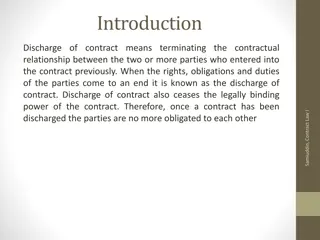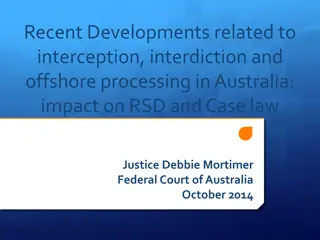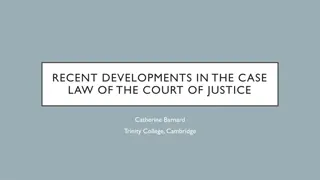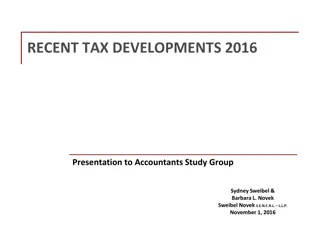
Recent Developments in Contract Law: Insolvency Reforms & Ipso Facto Clauses
Explore the latest updates in contract law, focusing on insolvency reforms and ipso facto clauses. Learn about significant cases, legislative changes, and the impact on businesses. Stay informed on key legal developments shaping the field of contract law in Australia.
Download Presentation

Please find below an Image/Link to download the presentation.
The content on the website is provided AS IS for your information and personal use only. It may not be sold, licensed, or shared on other websites without obtaining consent from the author. If you encounter any issues during the download, it is possible that the publisher has removed the file from their server.
You are allowed to download the files provided on this website for personal or commercial use, subject to the condition that they are used lawfully. All files are the property of their respective owners.
The content on the website is provided AS IS for your information and personal use only. It may not be sold, licensed, or shared on other websites without obtaining consent from the author.
E N D
Presentation Transcript
Contract Law - Case Update and Recent Developments Peter Moran Principal peter@peerlegal.com.au Katerina Pshenichner Senior Associate katerina@peerlegal.com.au
Stay on ipso facto clauses Legislation Exceptions Small Business Unfair Contract Terms Refresher Australian Competition and Consumer Commission v JJ Richards & Sons Pty Ltd [2017] FCA 1224 Australian Competition and Consumer Commission (ACCC) v Servcorp Ltd [2018] FCA 1044 Overview Contract Law Case Updates and Recent Developments | 22 March 2019 Page 3
Termination and repudiation Brand2Content Pty Ltd t/as Franchise Works v Solar Australia Pty Ltd [2018] NSWSC 56 Anticipatory Breach Upside Property Group Pty Ltd v Tekin [2017] NSWCA 336 Part Performance Pipikos v Trayans [2018] HCA 39 Overview Contract Law Case Updates and Recent Developments | 22 March 2019 Page 4
Legislation commenced on 1 July 2018 Explanatory memorandum states The Government is reforming Australia s insolvency laws. Our current insolvent trading laws put too much focus on stigmatising and penalising failure. As part of the National Innovation and Science Agenda (NISA) these reforms aim to promote a culture of entrepreneurship and innovation which will help drive business growth, local jobs and global success. This reform is aimed at enabling businesses to continue to trade in order to recover from an insolvency event instead of these clauses preventing their successful rehabilitation. Stay on ipso facto clauses - background Contract Law Case Updates and Recent Developments | 22 March 2019 Page 5
Section 451E of the Corporations Act 2001 (Cth) (1) A right cannot be enforced against a company for: (a) the reason that the company has come or is under administration; or (b) the company's financial position, if the company is under administration; or (c) a reason, prescribed by the regulations for the purposes of this paragraph, that relates to: (i) the company coming, or possibly coming, under administration; or Stay on ipso facto clauses - legislation (ii) the company's financial position; if the company later comes under administration; or (d) a reason that, in substance, is contrary to this subsection; if the right arises for that reason by express provision (however described) of a contract, agreement or arrangement. Contract Law Case Updates and Recent Developments | 22 March 2019 Page 6
Rights which arise by virtue of a company: being in administration; being subject to a scheme of arrangement; or having appointed or being about to appoint a controller, are not able to be enforced against that company. Stay on ipso facto clauses - legislation Contract Law Case Updates and Recent Developments | 22 March 2019 Page 7
An Event of Default occurs if: without the consent of the Secured Party, the Grantor or a Related Party, while solvent and for the purpose of reconstructing or amalgamating the Grantor or the Related Party, enters into, or resolves to enter into, a scheme of arrangement, administration, deed of company arrangement or composition with, or assignment for the benefit of, all or any class of its creditors, or it proposes a reorganisation, moratorium or other administration involving any of them, or the Grantor or the Related Party resolves to wind itself up, or otherwise dissolve itself, or gives notice of intention to do so. Stay on ipso facto clauses sample clause Contract Law Case Updates and Recent Developments | 22 March 2019 Page 8
The stay lasts for the period of the administration or when the company is wound up or by order of the court. Credit rights post-administration cannot be asserted by the company in circumstances where the creditor cannot then enforce their rights against the company by virtue of the stay. Only applies to rights granted under agreements post 1 July 2018 (and, until 2023, novations, assignments and variations post 1 July 2018 will not bring contracts within the regime). Stay on ipso facto clauses useful information Rights of set-off are not allowed either. Step in rights are precluded from being exercised. See The Corporations Amendment (Stay on Enforcing Certain Rights) Declaration 2018. Contract Law Case Updates and Recent Developments | 22 March 2019 Page 9
Regulation 5.3A.50 of the Corporations Regulation 2001 (Cth) The stay does not apply, amongst others, when: The right was granted after the administration commenced. The administrator/liquidator consents to the enforcement of the right. Contract relates to Australia s national security, border protection or defence. Contract relates to supply of goods or services to or by a public hospital. Stay on ipso facto clauses - exceptions Contract is for supply of essential works for government. Contracts for derivatives, securities financing transactions, underwriting of securities, financial products, bonds, promissory notes or syndicated loans, margin lending facility, management of financial investments. Contract for a special purpose vehicle for public-private partnership, securitization and certain project finance arrangements. Page 10 Contract Law Case Updates and Recent Developments | 22 March 2019
Small business unfair contract terms regime tested quick refresher Regime applies to contracts entered into (including renewals and variations) after 12 November 2016. A term of a small business contract is void if the term is unfair and the contract is a standard form contract section 23(1) of the Australian Consumer Law. A contract is standard form unless it is proved otherwise (section 27(1)). A small business contract is: 1. a contract for goods or services; 2. at least one party to the contract employs less than 20 people; and 3. the upfront price in the contract does not exceed $300,000 or, for contracts with a duration of more than 12 months, $1,000,000. Contract Law Case Updates and Recent Developments | 22 March 2019 Page 11
Small business unfair contract terms regime tested quick refresher A contract is unfair if: It would cause significant imbalance in the parties rights and obligations under the contract (section 24(1)(a)). It is not reasonably necessary in order to protect the legitimate interests of the party who would be advantaged by the term (s 24(1)(b)). It would cause detriment (whether financial or otherwise) to a party if it were to be applied or relied on (s24(1)(c)). Contract Law Case Updates and Recent Developments | 22 March 2019 Page12
Small business unfair contract terms regime tested quick refresher A court may take into account such matters as it thinks relevant, but must take into account the extent which the term is transparent. Transparency means whether the term is: expressed in reasonably plain language; legible; presented clearly; and readily available to any party affected by the term. Section 25 sets out at length examples of clauses that would be unfair. Contract Law Case Updates and Recent Developments | 22 March 2019 Page13
Australian Competition and Consumer Commission v JJ Richards & Sons Pty Ltd [2017] FCA 1224 JJ Richards had entered into 26,000 waste management services contracts with small businesses. 8 different standard clauses were held to be unfair. Automatic renewal clause - Created imbalance because the renewal term was the same as the term. No obligation on JJR to inform customer. Exacerbated by the price variation, exclusivity and termination clauses. Price variation clause -JJR could increase by providing 30 days notice. Created imbalance because there was no corresponding right to terminate or obtain a change in scope or scale of service. Agreed times clause - JJR had protection for not completing services at required times even if circumstances beyond control of client. Created imbalance by absolving JJR of performance obligations and requiring customers to assume risk of non-performance. Contract Law Case Updates and Recent Developments | 22 March 2019 Page14
Australian Competition and Consumer Commission v JJ Richards & Sons Pty Ltd [2017] FCA 1224 No credit without notification JJR could charge for attending premises but being unable to perform the services. Exclusivity clause JJR had exclusive rights to the removal of waste, even if client seeking additional services beyond those provided by JJR. Created imbalance. Credit terms clause requires counterparty to pay within 7 days and JJR can continue charging whilst providing no services. No corresponding right to withhold payment if no services provided by JJR. Indemnity clause creates an unlimited indemnity in favour of JJR even where loss is not fault of the counterparty or could have been avoided or mitigated by JJR. Not corresponding benefit to counterparty. Termination clause prevents a termination by counterparties if there are amounts owing and entitle JJR to continue charging even if no services being provided. Created imabalance. No corresponding right. Contract Law Case Updates and Recent Developments | 22 March 2019 Page15
Australian Competition and Consumer Commission v JJ Richards & Sons Pty Ltd [2017] FCA 1224 Transparency The terms were not transparent because: Written in legal language, not plain English. Could have been presented in a clearer manner. Could have been more readily available. Printed in a very small font. A densely packed page of small print terms and conditions. Obiter - Lack of transparency is not essential to showing terms are unfair. Obiter - Interaction between the clauses in increasing the unfairness was important too. Contract Law Case Updates and Recent Developments | 22 March 2019 Page16
Australian Competition and Consumer Commission (ACCC) v Servcorp Ltd [2018] FCA 1044 Servcorp provided serviced and virtual offices services. Contracts pre-dated regime but were renewed after. Clauses held to be unfair: Renewal clause if notice not given, Servcorp could unilaterally increase price and client lcoked in for between 6 and 12 months. No obligation on Servcorp to notify. Limitation of liability clause could exclude liability for loss, theft or damage caused by Servcorp. Limitation for suing landlord, even where legitimate claim. No reciprocal limitation. Variation of services and price Servcorp can unilaterally vary the services provided and the charges, with no requirement to provide notice, act reasonably or consult with the client. Notice clause - clause which allows Servcorp to determine if it has been served by having to provide a confirmation of receipt. The corresponding service clause did not have this requirement. Contract Law Case Updates and Recent Developments | 22 March 2019 Page17
Australian Competition and Consumer Commission (ACCC) v Servcorp Ltd [2018] FCA 1044 Termination right clause allowing immediate termination without notice if not complying with laws, regulations and procedures. Therefore, a termination could occur without a material breach, an opportunity to rectify or even a notification of the breach. Termination right can terminate without cause or compensation on one month s notice. Very limited termination rights for the counterparty. Deposit clause no obligation on Servcorp to return the deposit or provide notification of forfeiture of deposit. Limitation on liability - unlimited limitation of liability clause for Servcorp except in case of gross negligence or wilful misconduct. There is then a corresponding indemnity back to Servcorp. Penalty clause Servcorp can demand a penalty of $15,000 for the counterparty for two years after the contract enticing someone to use someone other than Servcorp. Payment is regardless of whether loss is suffered. Counterparty may have little ability to know if someone is a customer of Servcorp. Contract Law Case Updates and Recent Developments | 22 March 2019 Page18
Small business unfair contract terms regime tested - lessons 1. Clauses without a corresponding right for the counterparty could be problematic. 2. How the contract is presented matters (eg the size of the font or how easy it is to find). 3. Interaction between clauses matters in potentially increasing the unfairness. 4. Plain English drafting matters. 5. Terms can still be unfair even if they are transparent. A term is less likely to give rise to a significant imbalance if there is a meaningful relationship between the term and the protection of a party, and that relationship is reasonably foreseeable at the time of contracting. The fact that a party might profit from breaches of contract by a customer, without the customer in breach acquiring something in return, would not alone be sufficient to allow it to be concluded that the term caused a significant imbalance in the parties rights and obligations arising under the contract. J Moshinsky from JJR Richards Contract Law Case Updates and Recent Developments | 22 March 2019 Page19
Termination and repudiation When does a breach of contract by one party entitle the other to terminate? Intermediate term (sufficiently serious breach of a non- essential term) right to terminate Condition (essential term) - right to terminate Warranty (non- essential term) - no right to terminate Contract Law Case Updates and Recent Developments | 22 March 2019 Page 20
Termination and repudiation The breach of intermediate terms does not give rise to an automatic right of termination but may give rise to a right of termination where the breach or breaches of the term are serious or gross: Koompahtoo Local Aboriginal Land Council v Sanpine Pty Ltd (2007) 233 CLR 115; [2007] HCA 61 Intermediate terms Contract Law Case Updates and Recent Developments | 22 March 2019 Page 21
Brand2Content Pty Ltd t/as Franchise Works v Solar Australia Pty Ltd [2018] NSWSC 56 Solar Australia argued it could terminate because Franchise Works had breached a number of non- essential terms and terms of collateral contracts that, taken together, deprived Solar Australia of a substantial part of the benefit of the contact. Solar Australia relied on Koompahtoo including a statement of Gleeson CJ in the transcript of argument: The contractual obligation is not of itself of such an essential nature that you can say any breach of it, however trivial, justifies termination, but repeated breaches of that obligation, regardless of what it conveys about the intention of the party in breach, can bring you to a situation where the other party can say, That is the last straw . Contract Law Case Updates and Recent Developments | 22 March 2019 Page 22
Brand2Content Pty Ltd t/as Franchise Works v Solar Australia Pty Ltd [2018] NSWSC 56 Ball J rejected this argument on two grounds: Statements made during the course of argument are not authority for anything. Gleeson CJ s statement was directed to multiple breaches of a single term, not breaches of a number of terms, including terms of collateral contracts. Contract Law Case Updates and Recent Developments | 22 March 2019 Page 23
Brand2Content Pty Ltd t/as Franchise Works v Solar Australia Pty Ltd [2018] NSWSC 56 Result: Solar Australia was not entitled to terminate the Agreement and so its conduct was repudiatory. Lessons: It is safer to terminate based on an express right in the contract. If you wrongly terminate, your conduct could be repudiatory. Approach any termination based on intermediary terms with caution. Contract Law Case Updates and Recent Developments | 22 March 2019 Page 24
Anticipatory breach Upside Property Group Pty Ltd v Tekin [2017] NSWCA 336 The parties entered into a contract for the sale of land. After the time for completion had passed, Mr Tekin (the vendor) issued a notice to complete and later purported to terminate the contract for failure to comply with that notice. Upside Property (the purchaser) argued that this was wrongful repudiation and elected to terminate the contract and brought an action for anticipatory breach of contract seeking substantial damages for loss of bargain (or, alternatively, loss of profit). Contract Law Case Updates and Recent Developments | 22 March 2019 Page 25
Upside Property Group Pty Ltd v Tekin [2017] NSWCA 336 The court held that there are three possible entitlements when it comes to anticipatory breach: 1. Entitlement to terminate, in order to be discharged from future performance and recover any deposit. 2. Entitlement to bring a cause of action in damages for anticipatory breach. 3. Entitlement to recover substantial damages for loss of bargain in such an action. Contract Law Case Updates and Recent Developments | 22 March 2019 Page 26
Anticipatory breach Entitlement to terminate The view that a party wishing to terminate a contract for anticipatory breach must be ready and willing to perform its obligations has been questioned as not justified by principle or common sense. Uncertainty remains about this point, unresolved by the court. Contract Law Case Updates and Recent Developments | 22 March 2019 Page 27
Anticipatory breach Must have proof that the innocent party: Entitlement to bring a cause of action in damages for anticipatory breach was sufficiently on track to perform had reasonable prospect of being able to complete in the future was not substantially incapacitated Contract Law Case Updates and Recent Developments | 22 March 2019 Page 28
Anticipatory breach Entitlement to recover substantial damages for loss of bargain in such an action. The innocent party must have proof that more probably than not completion would have occurred in the events which happened, other than the repudiation and its consequences. Contract Law Case Updates and Recent Developments | 22 March 2019 Page 29
Anticipatory breach Result Appeal dismissed. The court was not satisfied that, at the time of termination, Upside Property was not substantially incapacitated from completing. Lessons Entitlement to bring a cause of action in damages depends on the innocent party s ability to show that it is willing and able to perform its obligations It is unclear if the innocent party can accept a repudiation and terminate if it is not willing and able to perform. Contract Law Case Updates and Recent Developments | 22 March 2019 Page 30
Termination on public policy grounds Civil and Allied Technical Construction Pty Ltd v A1 Quality Concrete Tanks Pty Ltd [2018] VSCA 157 Civil & Allied Technical Construction Pty Ltd is a construction contractor. Quality Concrete Tanks specialises in the construction of concrete tanks. Civil was a head contractor in a government contract and was responsible for the construction of two clarifier tanks. Civil negotiated with A1 with a view to engaging A1 as a subcontractor to construct the two clarifier tanks. A1 never undertook that work because Civil determined not to proceed with A1. There was then a dispute between Civil and A1 as to whether a contract had been made which Civil had repudiated. Contract Law Case Updates and Recent Developments | 22 March 2019 Page 31
Termination on public policy grounds Civil and Allied Technical Construction Pty Ltd v A1 Quality Concrete Tanks Pty Ltd [2018] VSCA 157 Civil argued that the contract was unenforceable because the intended mode of performance by A1 included sham contracting (treating its employees as if they were independent contractors). Contract Law Case Updates and Recent Developments | 22 March 2019 Page 32
Termination on public policy grounds Principles set out in Civil and Allied Technical Construction Pty Ltd v A1 Quality Concrete Tanks A contract does not become unenforceable merely because something illegal is done in the course of its performance. Where enforcement is said to be precluded on grounds of public policy, the illegality contended for must be of real significance in relation to the subject matter of the contract which is sought to be enforced. It cannot be a matter which is incidental or peripheral to the real purpose or object of the transaction. The illegal purpose must go to the substance of the transaction. Contract Law Case Updates and Recent Developments | 22 March 2019 Page 33
Termination on public policy grounds Principles set out in Civil and Allied Technical Construction Pty Ltd v A1 Quality Concrete Tanks The principle which precludes recovery on the basis of public policy is directed at preventing an affront to the public conscience or involving the court in upholding seriously anti-social conduct which is illegal or gravely reprehensible. In the modern context, courts should be slow to nullify a bargain on the basis of what may be properly characterised as regulatory non-compliance. Contract Law Case Updates and Recent Developments | 22 March 2019 Page 34
Termination on public policy grounds Civil and Allied Technical Construction Pty Ltd v A1 Quality Concrete Tanks Result Appeal was dismissed because: The asserted illegality was not apparent on its face or clearly and persuasively established. The asserted proposed illegality was incidental or peripheral to the contract. The relevant contract was for the construction of the tanks. It had no illegal object and it required no illegal act in its performance. The fact that A1 planned to perform the contract in a way which was said to breach tax, superannuation, and employment laws was incidental or peripheral to the contract, in the same way as a myriad of decisions on a commercial building project might breach relevant regulatory requirements. Contract Law Case Updates and Recent Developments | 22 March 2019 Page 35
Termination on public policy grounds Civil and Allied Technical Construction Pty Ltd v A1 Quality Concrete Tanks Lessons The illegality must go to the substance of the transaction reflected in the contract, rather than the method of performance. e Better to include an express termination right in the contract that will be triggered by a breach of law in the course of performing the contract, rather than to rely on public policy grounds as a basis for termination. Contract Law Case Updates and Recent Developments | 22 March 2019 Page 36
Part performance Earl of Selborne LC in Maddison v Alderson (1883) 8 App Cas 467 at 478: the acts relied upon as part performance must be unequivocally, and in their own nature, referable to some such agreement as that alleged. Contract Law Case Updates and Recent Developments | 22 March 2019 Page 37
Part performance Pipikos v Trayans [2018] HCA 39 Leon argued that he held an interest in property. The only documentary evidence of any agreement was a handwritten note. The agreement did not meet the formality requirements of s 26(1) of the Law of Property Act 1936 (SA). Leon contended that the doctrine of part performance meant that the agreement had to be specifically performed. Contract Law Case Updates and Recent Developments | 22 March 2019 Page 38
Part performance Pipikos v Trayans [2018] HCA 39 requirement of unequivocal referability Leon argued that it is unduly demanding of a party seeking specific performance of a parol contract for the sale of land to require that the acts of part performance be "unequivocally, and in their own nature, referable" to a contract of the kind asserted by the party seeking specific performance. Leon urged the adoption of a more relaxed approach. Contract Law Case Updates and Recent Developments | 22 March 2019 Page 39
Part performance Pipikos v Trayans [2018] HCA 39 arguments The approach of Lord Selborne in Maddison v Alderson was flawed in that it focused upon a concern about the evidence required to prove the parol contract. The true basis of the doctrine is the concern to prevent unconscientious conduct. The doctrine of part performance should be extended to the circumstances of the present case consistently with liberalising trends in the development of the law of equitable estoppel. Contract Law Case Updates and Recent Developments | 22 March 2019 Page 40
Part performance Pipikos v Trayans [2018] HCA 39 Result The High Court held that it would be inappropriate to relax the requirement of the doctrine of part performance that the acts relied upon as part performance must be unequivocally, and in their own nature, referable to an agreement of the kind alleged. Neither party performed any act that was unequivocally referable to the property in question. There was no giving or taking of possession of that land. There were no other acts indicative of a change in the respective positions of the parties in relation to the land. Leon was unsuccessful. Contract Law Case Updates and Recent Developments | 22 March 2019 Page 41
Contract Law - Case Update and Recent Developments Peter Moran Principal peter@peerlegal.com.au Katerina Pshenichner Senior Associate katerina@peerlegal.com.au






















